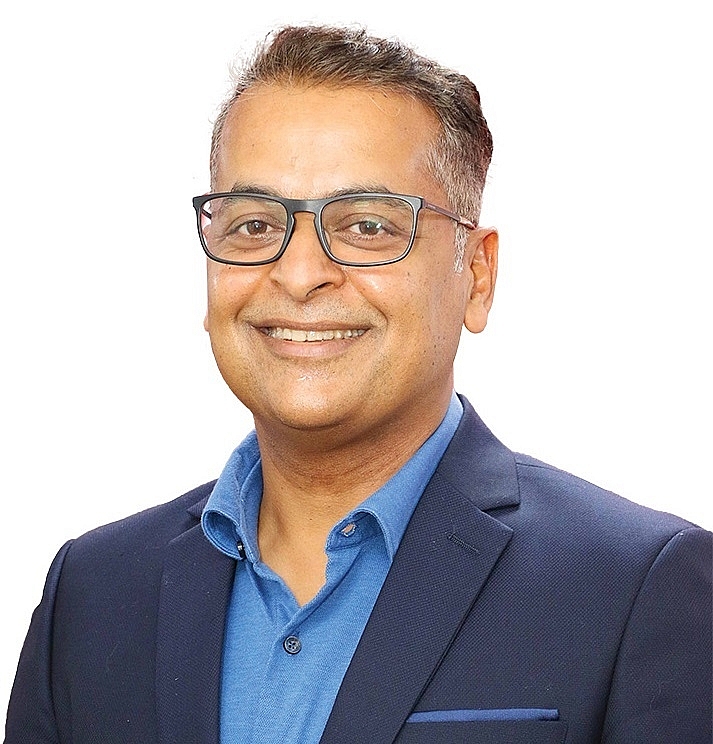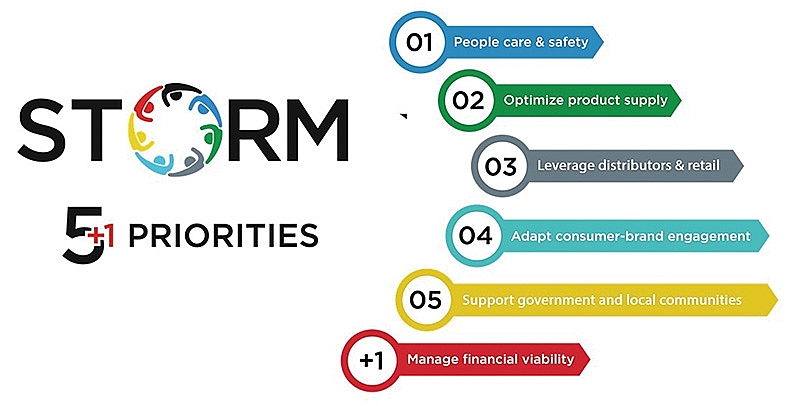“People first, profit later”
Crisis response à la Nestlé
 |
| Binu Jacob, CEO of Nestlé Vietnam |
Nestlé Vietnam has been one of the few solid points in the lives of employees and consumers during the COVID-19 pandemic. How did you manage to inject stability into their lives in these turbulent times?
When COVID-19 hit, all our lives were turned upside down, including mine. I came here on March 18 and before I could even meet the entire team, we went into lockdown. You can imagine how difficult a beginning we had.
In times like this, the role of leadership, not only from the top but at every level comes even more to the forefront. Luckily, just before we went into lockdown, we reprioritised our operations. Very early on, we set 5+1 priority areas (see chart) as a business, deciding that we will only do these and nothing else. All other plans we previously had for 2020 were put on the backburner.
We created task forces for each of these priorities, with clear streams and routines. In hindsight, this was the most important thing we did because if you are not clear about what you have to do in a crisis, the entire team is going to feel disrupted and unstable.
From the beginning, we made it very clear that we have no intention to lay anyone off or to reduce incomes and incentives. As an example, in February, many of our sales colleagues would have missed their targets, so we decided to pay incentives based on their efforts and not on sales target achievement. Our foremost task was to reassure people that this company cares and does what is right.
What was the response in Vietnam to this “people first” approach, and how do you think this attitude relates to your image and your brands’ success in the future?
Our fundamental thinking with the crisis was “Let’s focus on doing the right thing.” If we do the right thing, people will trust us more and on the long-term, companies who have built trust will benefit.
Times of crisis like this show the true character of a company, and I believe we have managed to show that Nestlé and Nestlé Vietnam’s first focus is on our people and our larger ecosystem of distributors and suppliers.
When the crisis hit, we started donating free products and cash to the communities that we work with, including small customers. During that time not once was I questioned by our head office.
This is an important message for all of us, especially companies who are looking at long-term sustainable growth: a crisis is not a time to focus on profit, it is a time to focus on people and your purpose. It is a time when more than ever companies should give, not take.
The more you focus on why you exist, the more you focus on the people who make it happen, the more you will build trust and respect Profit is a long-term derivative of doing the right thing. In the short-term you might lose, but we are not here just for the short term.
We donated almost VND40 billion ($1.74 million) worth of products and cash during that time, but for me, it’s not so much about the value but the focus the company has kept throughout. Our front line sales force spent a significant part of their time visiting stores and distributing free products to small customers, instead of only chasing sales targets.
 |
You emphasised the importance of fast action, saying “Done is better than perfect”. Which decisions did you have to make following this rule and what were the results?
That is something I learned from Google when I visited their office some 10 years ago. The phrase was posted on the wall and they told me this is a mantra of Google. Fundamentally, they believe that it is better to make a decision, sometimes the wrong decision, than no decision at all because you always need to have the flexibility to adapt.
Large companies invest heavily in data-driven decisions. However, when COVID-19 hit, we were forced to take positions with incomplete data. For instance, we usually make quarterly sales targets based on historical records, baseline targets, and planned activities among others – but during the outbreak we could not wait for perfect information and had to make decisions based on gut feeling. It was just based on conversations, based on what people thought and felt.
We then went from three-monthly to monthly targets, but at the end of each month we would take a considerate view and not penalise our staff for not hitting the targets. Nothing was cast in stone and we took a pragmatic approach by recalibrating targets after every month.
It was the same way for production planning. We normally prepare monthly production plans, but during the crisis we were adjusting production on a daily basis. We often set production output for the next day based on sales results from the previous day.
With every passing month, we got better and better at calibrating our targets. There were times when we set low targets and times when they were too high. At first, many were of the opinion to set targets that even we thought were a little too high to make sure nobody slacks off, but in time we learned that impossible targets make people give up – and that is the last thing we wanted in these times.
What lessons in sustainability do you think corporations can draw from the pandemic and how will it affect their future strategies?
Many businesses have a unidimensional view of doing business, which links back to the philosophy that the only role of business is to improve shareholder value. Nestlé, throughout its 150 years, has never thought this way. We always thought the role of business has to go beyond profit. It has to make a difference and create long-term value for the society, the communities, and the people that we serve.
The pandemic was a wake-up call to the industry and business as a whole, urging us to start thinking about more than just ourselves. We need to start thinking about the ecosystem that we live in. There are some who believe that sustainability will lose importance as a result of the pandemic, but at Nestlé, we believe the opposite. We think this pandemic is only a start, only a teaser to the long-term issue of sustainability.
Companies like ours have a responsibility to address this issue and be a part of the solution. That is why as a company, we believe that we need to become a catalyst and share our experiences and philosophy with other companies and learn from others so that we bring momentum to the burning topic of sustainability.
We exist not only to do business but to spread the philosophy that when we do business, let’s also make sure that everybody benefits.
What the stars mean:
★ Poor ★ ★ Promising ★★★ Good ★★★★ Very good ★★★★★ Exceptional
 Tag:
Tag:
Themes: Together We Win
- Greater Mekong Subregion executives to discuss sustainable tourism
- TCPVN donates 1,200 medicine bags to COVID-19 patients in southwest
- AB InBev supports orphans with scholarships amid COVID-19
- Evaluating the reach of support in turbulent times
- Gamuda Land grants “Back to School” scholarships to support disadvantaged students
Related Contents
Latest News
More News
- The generics industry: unlocking new growth drivers (February 04, 2026 | 17:39)
- Vietnam ready to increase purchases of US goods (February 04, 2026 | 15:55)
- Steel industry faces challenges in 2026 (February 03, 2026 | 17:20)
- State corporations poised to drive 2026 growth (February 03, 2026 | 13:58)
- Why high-tech talent will define Vietnam’s growth (February 02, 2026 | 10:47)
- FMCG resilience amid varying storms (February 02, 2026 | 10:00)
- Customs reforms strengthen business confidence, support trade growth (February 01, 2026 | 08:20)
- Vietnam and US to launch sixth trade negotiation round (January 30, 2026 | 15:19)
- Digital publishing emerges as key growth driver in Vietnam (January 30, 2026 | 10:59)
- EVN signs key contract for Tri An hydropower expansion (January 30, 2026 | 10:57)






















 Mobile Version
Mobile Version